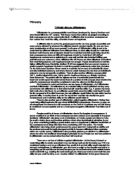It is important to point out that there are two types of utilitarianism, Act Utilitarianism and Rule Utilitarianism. Act utilitarians try to maximise utility in each individual act they carry out whereas rule utilitarians try to find rules that will maximise utility. E.g. A person has been told to tell a lie to his friend. An act utilitarian would think about the utility maximised if he told the lie compared to if he didn’t however, the rule utilitarian would follow the rule which has the greatest utility. In society there is a rule “do not tell lies” and this rule usually has good consequences and maximises utility so the utilitarian would follow it.
There is also another type of utilitarianism called negative utilitarianism. Rather than maximising utility/happiness this was about MINIMISING unhappiness. However, to wipe out all unhappiness the answer is to kill everybody on the Earth in a painless way and this theory is considered as unacceptable and as a consequence negative utilitarianism has fallen out of favour.
People would be in favour of utilitarianism due to it’s thoughts of concequence. It seems unethical to not think of the consequences when actions occur especially in important decisions. Utilitarianism also gives a set of principles, or morals, people can follow to make the world a better place and provides guidance when other deontological principles do not. E.g. when considering building a power station next to a river/forest a utilitarian would think of the consequences of doing this rather than considering JUST the action. The morals utilitarianism also bring about would prevent the power plant from being built as wildlife and the environment would be badly damaged and this is because utilitarians follow acts/rules which are morally correct. Utilitarianism also provides guidance on criticisms to utilitarianism where are other and traditional deontological principles do not. People can see how problems in utilitarianism can be solved rather than them left unsolved.
There are a number of criticisms against utilitarianism. As the theory is based on maximising utility in certain scenarios it may not always work out for the better e.g. if 10 men considered raping a woman as utilitarians they would do it as their utility would outweigh the woman’s unhappiness. In utilitarianism you also have to weigh up the benefits and harms to everything you do and this can be hard because you do not know what other outside factors could control this e.g. crossing the road would get you where you want to and maximise your utility but you could be hit by a car. Another criticism to utilitarianism is that good virtues are only valued if they lead to good consequences e.g. honesty is NOT good if it does NOT lead to good consequences yet honest is usually a good thing to be. Justice is also tainted in utilitarianism e.g. a person speeding may get a lengthy jail sentence and fine if the utility is maximised by putting people off doing it again but this isn’t just according to the crime committed
Advocates of utilitarianism respond to these points in support of utilitarianism. They say that we can weigh up the foreseen consequences to something and therefore come to an informed decision. Utilitarians also believe that if things have good consequences then virtues and values do not matter. Justice to the extreme, they believe, would only be done in extreme cases. If something did have an amazing effect then it would be done but otherwise it wouldn’t.
In conclusion utilitarianism is based purely on consequences to actions. The actions carried out themselves do not have anything to do with them. There are problems with utilitarianism e.g. the justice system and the factors which sometimes cannot be acknowledged but there are also benefits being the fact utility/happiness is always the factor trying to be increased and this usually works out for the greater good. There are many different utilities brought forward to the utilitarian way of thinking and the act and rule difference also gives a different view point to a utilitarian way of thinking.







